Canada Elects its First “Big Daddy” – the Worst Daddy Ever! (says the loopy-right)
Part 2/5: Too many Canadians (from both sides of the aisle) have been duped by false narratives about Mark Carney, something they ought to jettison if they'd prefer a proper understanding of Carney's strengths and weaknesses, an understanding that may be crucial in this time of American encroachment
Who's your daddy?
Briefly reiterating what was explained in part one (in which a short clip was relayed wherein a woman at a Liberal rally interrupted the event by supportively hollering out "Lead us big daddy!"), it should now be more than abundantly clear for all the deluded fan bois and fan girlz out there that Carney isn't some kind of James Bond mastermind who's so smart that he can financially outwit anybody on the planet, supposedly enabling him to single-handedly save Canada from the threat emanating from the south. That understanding this is important is due to the fact that if Canadians are going to stand any chance of withstanding the United States' renewed encroachment then they ought to properly understand Carney for what he is and isn't.
Because while some (the "loopy-left") are wont to depict Carney as if he's effectively the Second Coming, there's some on the opposite side of the aisle (the "loopy-right") that don't see him as benevolent daddy, but rather as its polar opposite – evil daddy. And if you thought the loopy-left described in part one was full of it, it's time to see why they've got nothing on the amount of excrement oozing out of every pore of those of the loopy-right.
Once that's cleared up, then we can get to understanding Carney for what he really is, and how Canadians should act accordingly.
WEF conspiracy theories
For those unaware, Carney has a bit of a storied past career-wise. After having attained a bachelor's degree in economics from Harvard in the late '80s (where he was a backup goalie for the university's NCAA hockey team) and then completed a master's degree as well as a PhD in economics at Oxford (the lattermost on the "dynamic advantage of competition"), Carney then spent a 13-year stint at investment firm Goldman Sachs through its offices in London, Tokyo, New York and Toronto. Following all that he was then governor of the Bank of Canada (BoC) for five years (2008 to 2013), followed up with a tenure as governor of the Bank of England (BoE) for another seven years (2013 to 2020).
Carney's career in both public and private spheres have earned him praise from various professional circles, but it was his involvement with the World Economic Forum (WEF) (concurrent with his time at the BoC and the BoE, as well as proceeding that period) that's garnered him the ire of various detractors. In what seems to have been indicative of what may have been a bit of a regular occurrence for Carney on the campaign trail, during a short talk he gave in Upper Onslow, Nova Scotia, about a week prior to the federal election, a group of conspiracy theorists (whose megaphone-amplified voices can be slightly made out in the clip below) decided to heckle Carney while he spoke.
(source: CPAC / YouTube)
Why label these people "conspiracy theorists"? Well, while the WEF is a non-governmental organisation and think tank, it's not – as many would like to believe – a cabal of super villains discussing their plans for world domination, a world in which the non-elites will own nothing and be relegated to diets of insects and the like. Rather, it's an organisation that can be broadly described as an assortment of international progressives, encompassing economists, policy makers, business executives, celebrities, religious leaders, politicians, journalists and scientists, to go along with a broad range of billionaires, charities and NGOs.
The individuals and groups involved with the WEF make the rounds at various conferences around the world, most notably at the WEF's annual meeting at the end of January in Davos, Switzerland. Solutions are proposed by those involved to an array of problems that the world faces, many of said individuals and organisations patting each other on their backs at these conferences for how smart and benevolent they supposedly all are. Yes, the solutions on the table at these events often advance more corporate control and fewer democratic institutions in the world, however that doesn't imply anything worthy of a grand conspiracy but rather is more along the lines of par for course when it comes to various issues social activists and community-oriented people are concerned about.
Automation of this sort is of course nothing new, a fundamental example being the way in which various forms of efficiency have driven – one might say forced – land-based cultures off the land and into ever-more crowded cities. As a side-effect, the connection to the land of agrarian societies long ago denuded people of the foundations of their culture(s), the underlying enabler of this enclosure of the commons being no less than the (finite) supply of fossil fuels, exactly what is hoped to power the AI revolution (which will be so power hungry that grids may not be able to handle the demand, leading to soaring energy costs, blackouts, etc.).
Based on outcomes of past centuries, the profits of the AI revolution's heightened automation can be expected to go to shareholders and not workers, supposed safety nets for those who lose their jobs then getting overlooked for greater concentrations of wealth. All the while, there should be no expectation from these white-collar offcasts for anybody to come to their defence and/or rescue, partially because, and to amend an old saying...
First they came for the agrarians, and I did not speak out – because I was not an agrarian...
While alt-right conspiracy theorists are quick to heckle and concoct all sorts of crazy theories about Carney's role in the WEF as "proof" of participation in some kind of global cabal of super villains, the disingenuous nature of their disdain is plain enough for all to see due to their willingness to ignore the WEF-association of their darling Stephen Harper (former prime minister of Canada), heavily right-leaning Harper having given the keynote speech in Davos in 2012 but somehow exempt from depiction as another global cabal super villain.
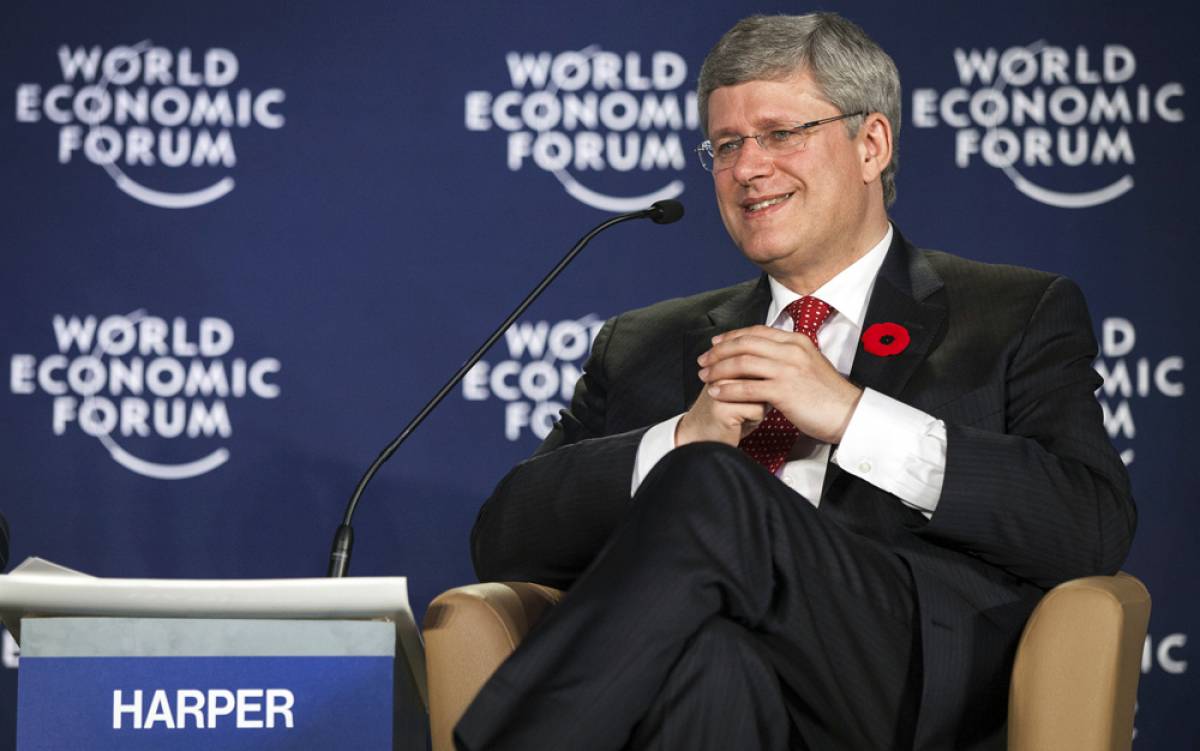
But don't think it's just your run-of-the-mill conspiracy theorists that have it out for Carney, what with one of his biggest detractors being the (former) University of Toronto psychology professor turned YouTube philosopher Jordan Peterson. Probably best described as "the desperate man's smart person, [who] feeds on angst and confusion", Peterson has been regarded by many as being a professional controversialist, a culture warrior, an intellectual fraud, a pop psychologist, and an intellectual guru of the alt-right.
Prior to the recent federal election Peterson invited Carney (a centrist/left-of-center politician) to appear on his YouTube show (what with Peterson having proclaimed with a straight face to be an "agreeable guy" who would have been a "reasonable interviewer") but was politely turned down due to what was said to be a shortage of time. In retrospect, it's hard to see why Carney's team would have gone out of their way to make time for Peterson, what with Peterson having more than just a differing political perspective.
For starters, Peterson penned an article that appeared on March 8th in The National Post, the Post being a US-owned Canadian newspaper founded by Canadian-born media baron Conrad Black. That would be the same Conrad Black that in 2007 was found guilty of fraud and summarily sentenced to six and a half years of jail by a US court, but who was then – to little surprise – given a full pardon in 2019 by none other than Donald Trump himself.
Peterson's article was largely a response to Carney's 2021 book Value(s): Building a Better World for All, and although the article predominantly focused on Carney's concern with climate change, Peterson also paralleled the ideas espoused by the megaphone-wielding conspiracy theorists Carney joked about in the Upper Onslow clip.
[Prime minister Justin] Trudeau was little more than a globalist shill, shiny and attractive though he may have been. Carney is no such mean thing; no mere WEF infiltrator. He is instead a veritable globalist author, master-planner and leader[.]
Otherwise put, Carney is supposedly a WEF-schemer clandestinely pulling the world's strings, fooling the world into thinking he's one of those "nice Canadians" when really he's hatching up all sorts of diabolical plans to control every last iota of the world.
And no, that isn't an exaggeration of the view that Peterson's selling, as we'll see below.
Climate change quackery
Climate change is of course much too large of a topic to be given its fair due in a mere piece about Canada's latest prime minister and one of his main ("loopy-right") detractors. Nonetheless, with Peterson's reference to "tyrannical climate change fear mongering" being emblematic of some of the most unhinged of Carney's critics, touching on a few of Peterson's climate change-related criticisms about Carney would do justice to delineating the wrong way in which to criticise Carney.
For those unaware, Peterson generally sits somewhere between the realm of climate chance minimiser and outright climate change denier. In that aforementioned Carney-centric episode of The Jordan B. Peterson Podcast (which was published a month after the National Post article), Peterson, for starters, praised the Dane Bjørn Lomborg, a political scientist who generally cherry-picks and misrepresents data to convey misleading impressions about climate change (and who is an advisory board member of Peterson's Alliance for Responsible Citizenship, the board including several other high-profile climate change deniers).
Peterson also offered up in the podcast episode the extremely simplistic fallacy that "plants love carbon dioxide, so it can hardly be regarded as a pollutant" as more CO2 supposedly results in "more plant growth and more plants", while also claiming that "the planet is actually 20% greener than it was 30 years ago". As Peterson surmised,
So you get more plant growth and more plants, and if you're a fan of green – like the greens hypothetically are, and the environmentalists – you'd kind of think more plants would be better.
Yes, you might kind of think that, so long as you look at things myopically and ignore the actual details.
For starters, the planet is in fact greener than it was a few decades ago – upwards of 20% greener. Problem is – or at least one of several problems – is that "greener" doesn't necessarily translate into anything beneficial, such as resulting in an increase in biodiversity, healthier ecosystems, etc. In fact, while it's believed that elevated levels of CO2 (i.e. air pollution) certainly do contribute to this increase in greening (as CO2 is a key ingredient in photosynthesis), it's simultaneously known that a large part of this greening is a result of intensive tree-planting in China and India, along with an increase in industrial agriculture – be it barren patches of land turned into farms or more crops being grown on the same amount of land. Moreover, the increase in greening isn't attributable solely to terrestrial activities but is also occurring in oceans.
As insinuated earlier, the industrial form of agriculture that's resulted in this greening is inherently monocultural, meaning singular crops of coffee of rubber or trees exist as the sole species in a plantation. Whereas diverse rainforests are home to various animals, rare plants, and assist in the regulation of local climate, none of these important aspects appear in simplistic measurements of mere greenery. And that's not to mention the fact that these monocultures require massive amounts of water, fertilisation and pesticides, all of which are widely recognised as harmful to humans and ecosystems.
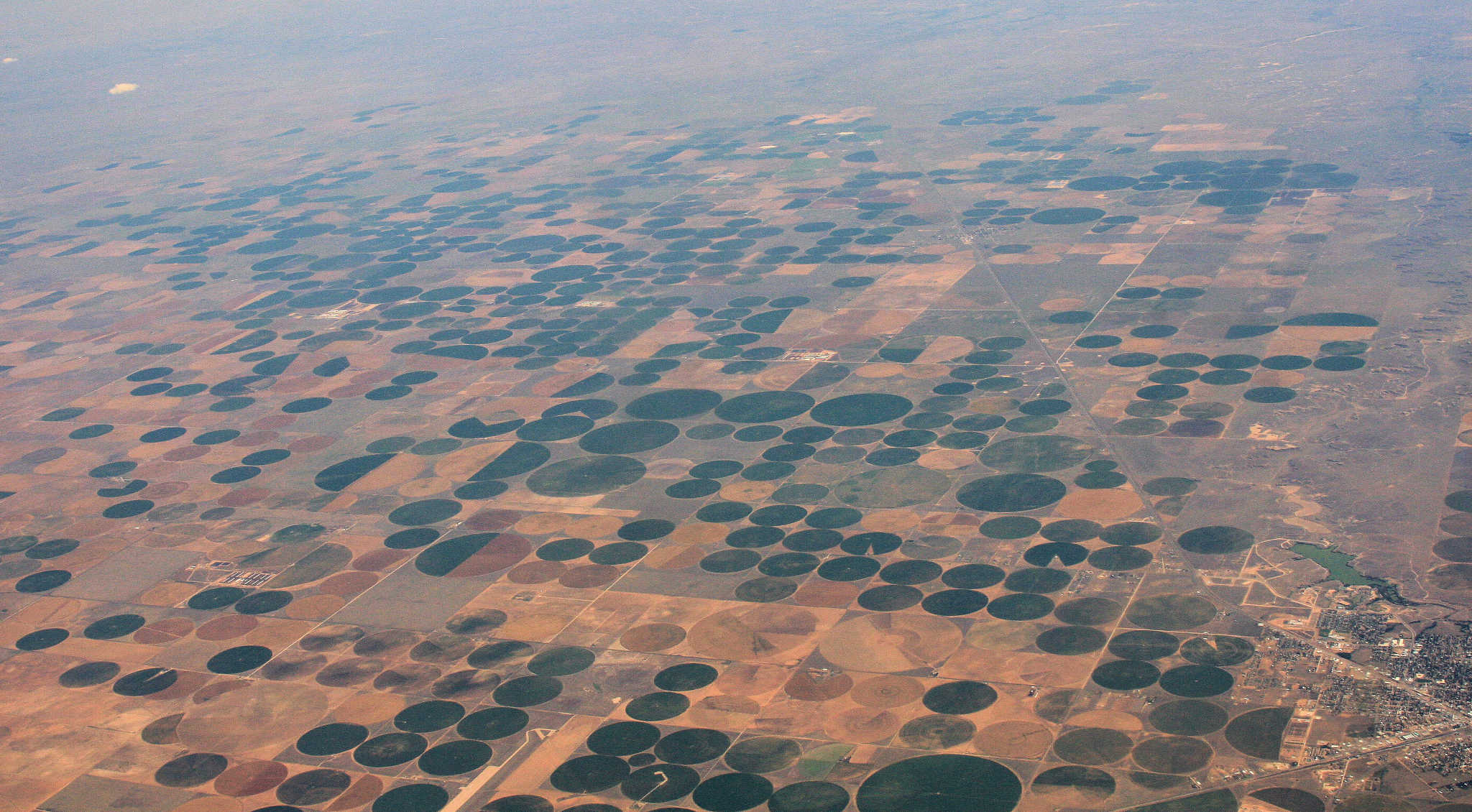
In terms of Peterson's similarly simplistic comments that "plants love carbon dioxide, so it can hardly be regarded as a pollutant" as more CO2 supposedly results in "more plant growth and more plants", we once again come across a few problems when one gets into the meat of things (and yes, I do literally mean "meat").
As should go without saying, while plants don't live solely off of CO2, they also live within complex ecosystems in which many factors are involved in their growth. To give just one example, since nitrogen is not simply often in short supply but also the predominant factor for how much growth occurs in plants, if there isn't ample nitrogen then there's little to no point in adding CO2 as productivity won't increase. If – based on other variables – additional CO2 does manage to result in extra growth, there's still the fact that plants are dependent upon nutrients gathered via their root systems. In effect, plants grown with excessive amounts of CO2 proportionately end up with lower levels of nutrients, a condition detrimental to human health.
Although the exact reasons for why increased levels of CO2 causes lower levels of nutrients isn't completely understood, a principal research scientist in environmental health at Harvard University was nonetheless able to state to Scientific American that
We know unequivocally that when you grow food at elevated CO2 levels in fields, it becomes less nutritious. [Food crops] lose significant amounts of iron and zinc—and grains [also] lose protein.
According to one study an increase in CO2 results in a decrease by 10-15% of protein levels in potatoes, rice, wheat and barley, another study pointing out that although rice grown with more CO2 has increased levels of vitamin E, it also results in decreased levels of vitamins B1, B2, B5 and B9. That's on top of the estimated 2bn people already nutrient deficient, it being estimated that CO2 levels expected by mid-century could result in protein deficiency for an additional 150m people as well as zinc deficiency for an additional 150m-200m people.
But to get into the aforementioned "meat of things", and as if all the above weren't already bad enough, it also turns out that a decline in 20+ essential elements in plants – caused by increased CO2 levels – has also resulted in the reduction of the quality of the food supply of herbivores, contributing to the decline in global herbivore abundance.
All in all, what Peterson seems to have missed in his declaration that "plants love carbon dioxide, so it can hardly be regarded as a pollutant" is the fundamental law of ecosystems, that being that "you can't do just one thing". Positive and negative factors can occur at the same time, the latter including the grandiose elephant in the room of elevated CO2 levels being the driver of climate change and thus drought and heat stress that will all but surely more than cancel out any gains made by said elevated levels of CO2 by way of decreased levels of food production and in turn famine.
Although we could give Peterson the benefit of the doubt and presume that he's somehow managed to misinform himself about all this à la Hanlon's Razor, it's more likely that he's taking part in a coordinated propaganda offensive by regurgitating disinformation talking points in order to benefit a fossil fuel industry agenda. The "I Love CO2" campaign and the "CO2 is good" meme are used to saturate the communication space, a few cherry-picked "facts" then bandied about in order to give the impression that CO2-as-a-good-thing is supported by "science", and anybody who disagrees is an alarmist doomer peddling fear. In short, the professional disinformation campaigns that Peterson and the like undertake work off of confusion, saturation, and repetition, and there's no reason to think they aren't doing the job for sizeable amounts of the population.
To top it all off, and to return to the observation made earlier of Peterson seemingly viewing Carney as someone "hatching up all sorts of diabolical plans to control every last iota of the world", Peterson's fundamental impression of Carney is no less than unhinged. In his National Post piece covering Carney's book Value(s), Peterson actually went so far as to hyperbolically claim that Carney's suggestion that all our economic decisions should take climate change into account "provides an utterly unlimited license for tyranny", while also twisting and reinterpreting Carney's talk of a "transition to a net-zero carbon economy" – whereby companies who fail to adjust will "cease to exist" (suggesting they'd go bankrupt or be priced out of the market or something) – in order to give the impression that the true meaning is that individuals who don't comply will presumably be murdered by the state or something.
Regardless of what you think about net zero, you don't have to see Peterson wildly gesticulating during one of his talks to think that he's completely off his rocker. It does, however, add to the easily-attained impression.
With net zero understood as the goal of balancing the amount of greenhouse gases that are produced with the amount that are removed from the atmosphere (predominantly by natural absorption, carbon capture and storage, and carbon dioxide removal – of which the two technologies mentioned don't actually exist at scale), the fact remains that the goal is a fantasy before the altar of economic growth. Since 1950 the human population has more than tripled while energy consumption has increased by more than six times, the onward push of incessant growth now resulting in power demand from data centres for AI making the net zero goal even more elusive and absurd thanks to coal plants unlikely to be decommissioned as previously planned.
Meanwhile, since GDP and energy consumption are tied at the hip (also understood as modern prosperity being dependent on energy supplies), the counter-factual presumption that GDP and energy consumption can be decoupled from one another – of which the possibility of net zero is also dependent upon – lends even more credence to the fantasy that net zero is.
So long as population, energy consumption, and world GDP continue to increase, carbon emissions will march in lockstep and prove net zero to be an illusory dream, regardless of the minimal gains being made with renewable energy supplies.
Coming from the opposite perspective, the second point to briefly highlight is that although Carney does (correctly) take climate change seriously, from all appearances it would seem that he fails to properly understand the underlying issue. That is, climate change isn't a mere error in the management of industrial civilisation that requires some tinkering in the economic system in order to rectify it all, but rather is a symptom of overshoot. Or otherwise put, climate change is ultimately a waste-management problem.
Civilisations have burned peat, wood, coal and even natural gas for millennia, the trees, oceans and soils of the time proving more than capable of absorbing the limited amounts of CO2 expelled into the air. But with a global population several orders of magnitude larger than it was at the dawn of agriculture (which in itself was also a period of tapping into a new source of carbon, the carbon existent in the soil), and with per capita carbon emissions also being several orders of magnitude greater, the planet can no longer absorb the excess carbon in an ecologically safe manner. In short, climate change, being a symptom of overshoot, is a problem of too many humans consuming too many resources expelling too much carbon dioxide. In other words, we've overshot the carrying capacity of the planet (like bacteria in a Petri dish), no longer living off of the "interest" (so to speak), but are drawing down upon the planet's capital. "Improved" economic systems and industrial processes – along with new technologies which invariably "just need to be scaled up" – are in all likelihood not going to ameliorate the fundamental problem of planetary overshoot.
Furthermore, even if climate change didn't exist global industrial civilisation would still be in the early stages of collapse due to all the other symptoms of overshoot, such as soil erosion, ocean acidification, decimated biodiversity, depleting aquifers, contaminated food supplies, and broad-based pollution. Climate change is simply the most publicised symptom of overshoot, which besides everything else amplifies and accelerates the overall process of collapse.
The Trump effect
Having very briefly explained why the conspiracy theories about Carney's association with the WEF are nonsense, and why the criticisms of Carney's recognition of climate change are based in ignorance (if not outright propaganda), the final delineation needed before moving on to deciphering how qualified Carney is to deal with threats of American encroachment is whether or not he owes his election to nothing more than Canadian disdain for Donald Trump and his threats to Canadian sovereignty.
As is now well known, one of the most notable political stories of 2025 is what's come to be known as "the Trump effect", a process in which political parties giving off the slightest whiff of Trumpian values are resoundingly rejected by their electorates. It started off in Canada when the Liberal Party pulled through with one of the largest comebacks in political history via their defeat of the Conservative Party, followed up five days later when the Australian Liberal Party got their asses handed to them by the nation's voters, ushering in the Labor Party with a resounding majority in which they tied the record for the most seats ever won by an Australian federal government. (For those unaware and/or confused, the Liberal Party in Canada is the centre-left party, while the Liberal Party in Australia is the centre-right party.)
To be fair, and to give credit where credit is due, the Canadian Liberals didn't win wholly because of the Trump effect (as many have lazily tried to claim). Following the December 16th 2024 resignation of Chrystia Freeland (then-prime minister Justin Trudeau's minister of finance and deputy prime minister), the "shockwaves" sent through Canadian politics resulted in Trudeau announcing on January 6th 2025 his pending resignation. Although Trudeau was highly admired overseas, after nine years in power he was disdained by a vast majority of Canadians, including many Liberals, the simple promise to vacate office proving enough to quickly result in a bump in polling numbers for the Liberals.
Literally a day later, on January 7th, Trump declared for the first time his desire to make Canada the 51st state by way of "economic force". In the coming days and weeks Trudeau stood his ground and stood up for Canada, to the point that not only was Trudeau able to go out on a renewed high courtesy of his strong defence of Canada, but some Canadians began (errantly) thinking that perhaps he shouldn't have resigned after all. There's virtually no chance that Trudeau would have won the election had of he stuck around, but Trudeau's comments made at the time (at one point making an on-air statement directly to Trump in which he referred to him – some might say condescendingly – as "Donald") nonetheless renewed feelings of admiration towards Trudeau while Trump's threats provided the impetus for the second significant boost to the political standing of the incumbent Liberals.
As a bit of an aside, and although a negative is by no means the way to define a people, Trudeau nonetheless spoke the truth when he stated on CNN – in one the first times he addressed the idea of Canada becoming the 51st state – that
Canadians are incredibly proud of being Canadian. One of the ways we define ourselves most easily is, well, we're not American. There is such a depth of pride that that's not actually an issue.
A couple of months later the Liberal standing in polls then made its third and final lurch when Mark Carney – seen as a steady hand in a time of economic uncertainty – won the Liberal party nomination on March 9th, then sworn in as prime minister on March 14th.
Although Carney's Liberals didn't win the majority they were widely expected to (partially thanks to my hometown riding which – although it wasn't the riding that lost by a single vote – swung from the Liberals to the Conservatives by a significant enough margin of which a visit by Carney a couple of days before the election wasn't enough to assuage), they did nonetheless cement one of the biggest comebacks in political history in which the Conservatives – which for over a year had a projected 99% chance of winning – not only lost for the fourth time in a row but saw their party leader lose his seat (as also occurred to the opposition leader in Australia).
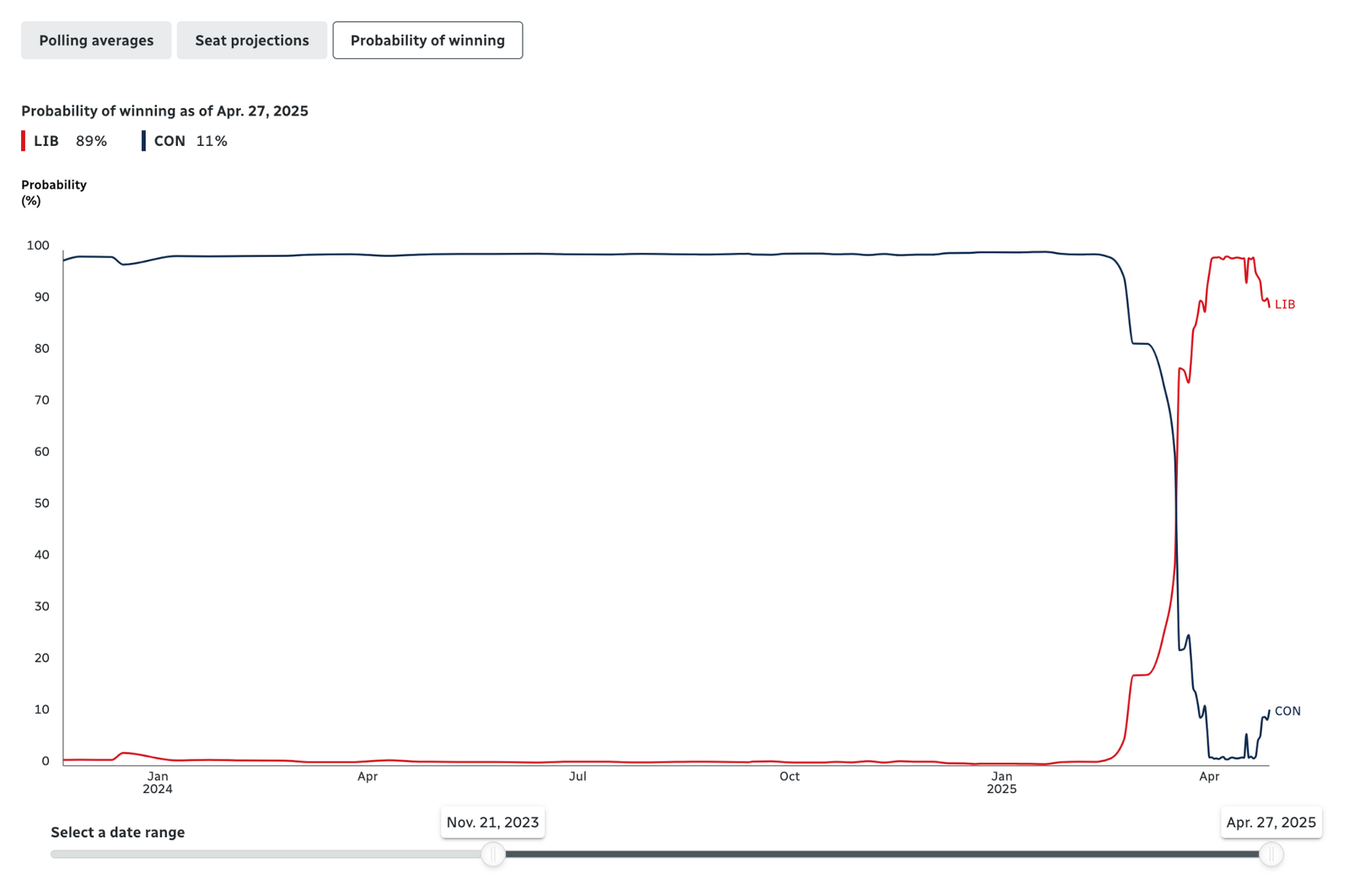
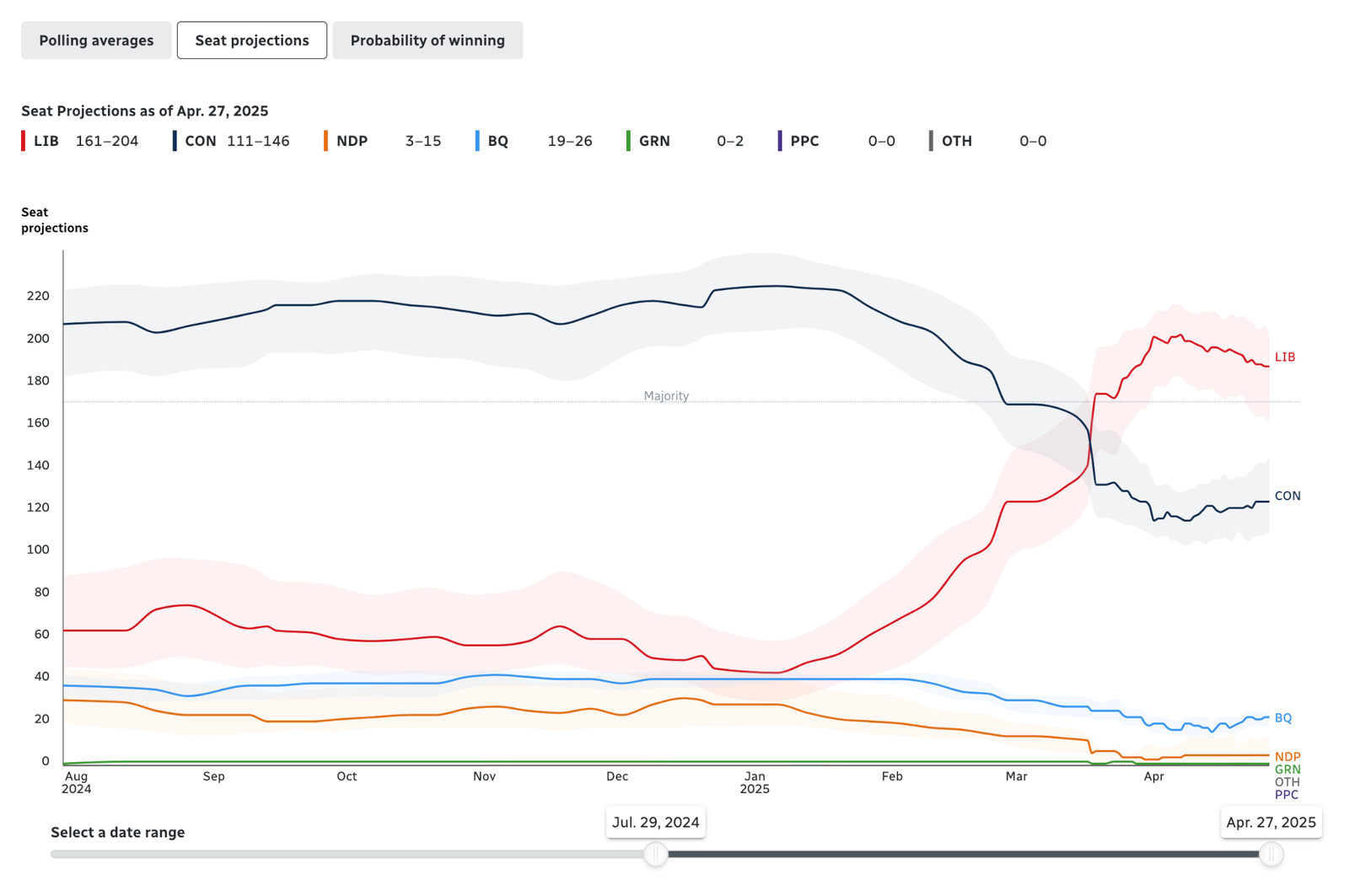
(source: CBC News Poll Tracker)
Putting aside the false assertion that the Liberal party's win came down to nothing but the Trump effect (the Liberals would have undoubtedly lost had of Trudeau ran, and all but certainly would have lost if Freeland had of won the nomination instead of Carney, at least in part because of her ties to Trudeau), what's perhaps most interesting is the way in which the Canadian anti-Carney crowd were able to speak out of both sides of their mouths when it came to interpreting the Trump effect. Many examples could be made regarding this aspect of the Canadian anti-Carney crowd, but in this case the particular anti-Carney Canadian we're going to single out is, once again, Jordan Peterson.
In Peterson's podcast episode focusing on Carney, published on April 11th (17 days before the election), his first mention of the Trump effect came when he claimed that Carney had received an "undeserved advantage".
Or [Carney] could call a snap election hoping that all of the noise around Donald Trump and his relatively foolish proclamations re: Canada has given Carney a [sic] undeserved advantage.
What Peterson is likely referring to by Carney's "undeserved advantage" is what's known as the "rally around the flag" effect whereby a short-term surge in voter approval occurs as a nation's people unite behind its leader during a time of crisis or emergency. Problem is, Canada isn't a dictatorship or theocracy whereby its people have no other recourse than to rally around its dictator or supreme leader (as might occur in Iran after the United States' recent bombing, but which hasn't occurred in democratic Israel), suggesting that Canadians could have easily decided to run even faster and further away from the despised Trudeau and instead rally around Pierre Poilievre and the many flags he liked to grandstand in front of.
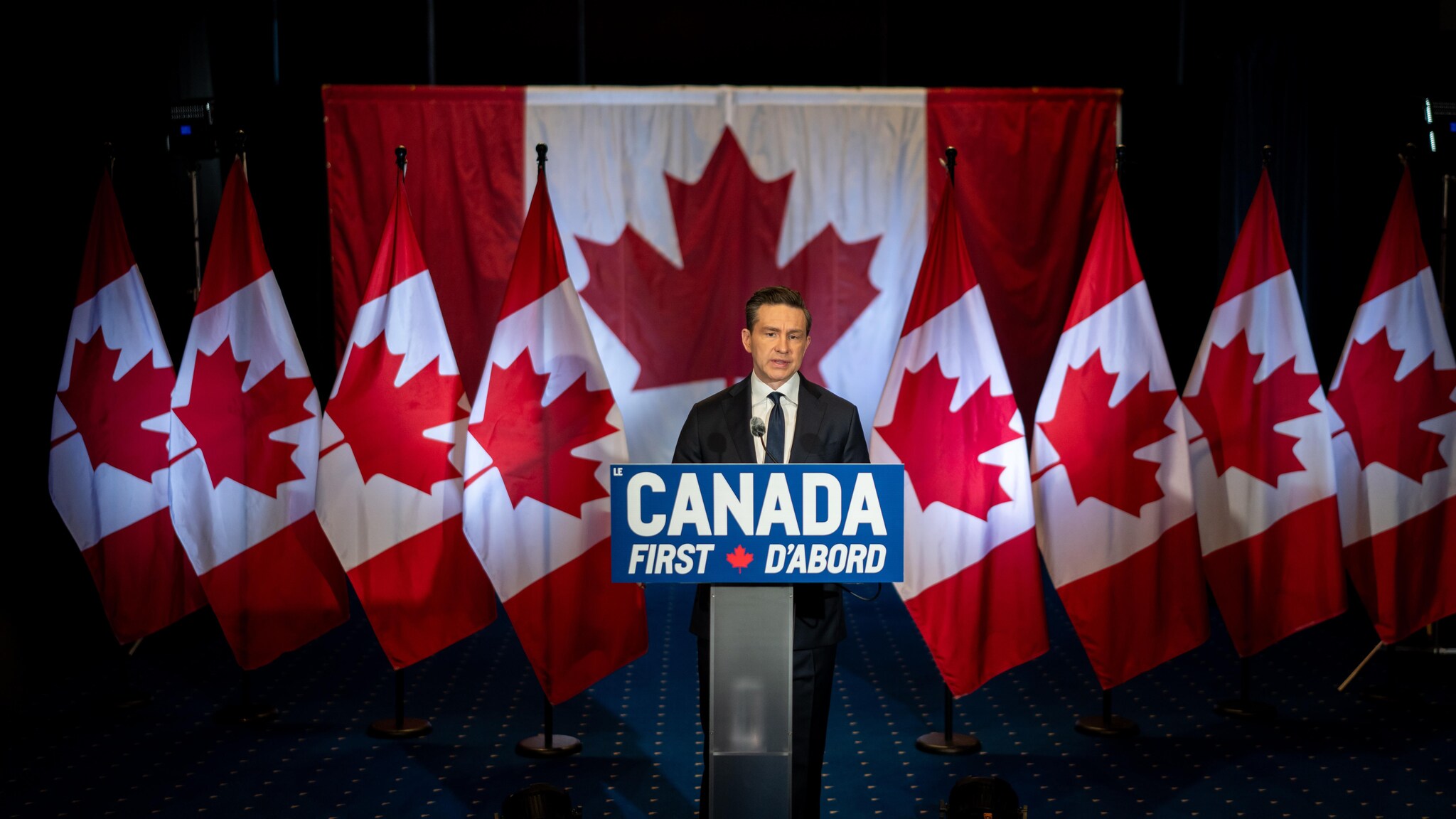
The reason for why Peterson saw Carney's supposed "advantage" being "undeserved"? Possibly because Peterson doesn't see – or at least claims to not see – Poilievre as being aligned with Trump whatsoever (or at least no more than Trudeau or Carney) and that he was unfairly tarnished with an undue association.
The issue of Trump and his sabre rattling, well, the accusations that have gone out with regards to Pierre Poilievre is that Poilievre is just MAGA light. You know, he's a Make America Great advocate – which he's not by the way – and that a vote for Poilievre is really a vote for the Trump types.
That supposed non-alignment would come as news to many, what with Poilievre having endlessly regurgitated Trump's talking points over the years. While a steady stream of comparisons were shared on social media during the election, the Liberal party itself put together a montage of clips comparing the two politicians, Poilievre coming off as more than merely MAGA light and more like – as many nicknamed him with the most Canadian-esque epithet possible – Maple MAGA.
(source: Liberal Video / YouTube)
Continuing on from the lattermost quote (in which Peterson was mysteriously incapable of deciphering what even a failing ESL student could easily comprehend), Peterson then insinuated that because Trump stated on Fox News that he had no preference for who won the election and that he didn't even like Poilievre (as Poilievre had supposedly said some "negative" things about Trump) we're in turn supposed to take Trump at face value.
Well, let's see what Trump himself thinks. Well, a few days ago, when this was recorded, Trump came out and said he didn't give a damn who ran Canada. And so, you know, we can conclude from that what we might as Canadians.
And what exactly was it that Trump stated (on March 19th) that Peterson referred to?
I'd rather deal with a Liberal than a Conservative.
[...]
The Conservative that's running is, stupidly, no friend of mine. I don't know him, but he said negative things. So, when he says negative things, I couldn't care less. I think it's easier to deal, actually, with a Liberal and maybe they're going to win, but I don't really care. It doesn't matter to me at all.
Because – as we all know – we should always devotedly put our trust in what pathological liars have to say.
To otherwise squeeze out a bit of gas on the fire, on March 8th, a week and a half before Trump made the latter remarks, Alberta premier Danielle Smith pleaded in an interview with the far-right website Breitbart for Trump to put his tariffs "on pause", seeing how the "dispute" surrounding them "seems to be benefiting the Liberals right now". Squeezing out yet a bit more, Smith also stated that she thought it'd be best to "have the best person at the table make the argument for how they would deal with [tariffs] — and I think that's Pierre Poilievre", also pointing out that "on balance, the perspective that Pierre would bring would be very much in sync with, I think, with the new direction in America".
Although not quite exactly an igniting-the-thermite moment, turns out that Smith (and Canadian TV personality Kevin O'Leary) happily posed with MAGA hat-wearing Trump at Mar-a-Lago, MAGA-loving Smith (and O'Leary) similarly posing with none other than (MAGA-loving?) Peterson himself on another occasion.
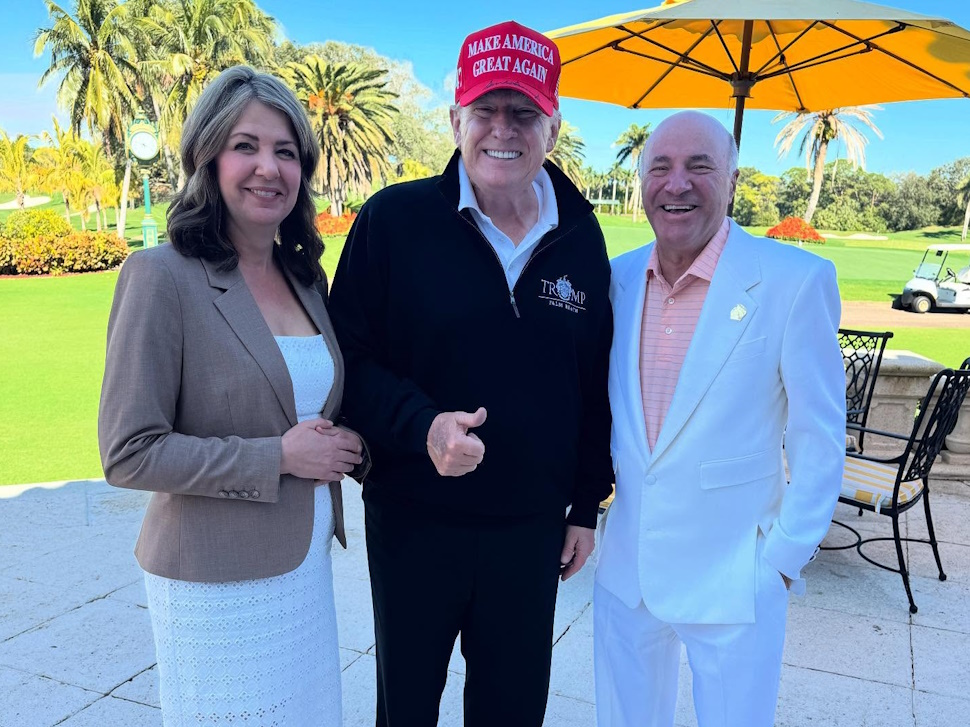
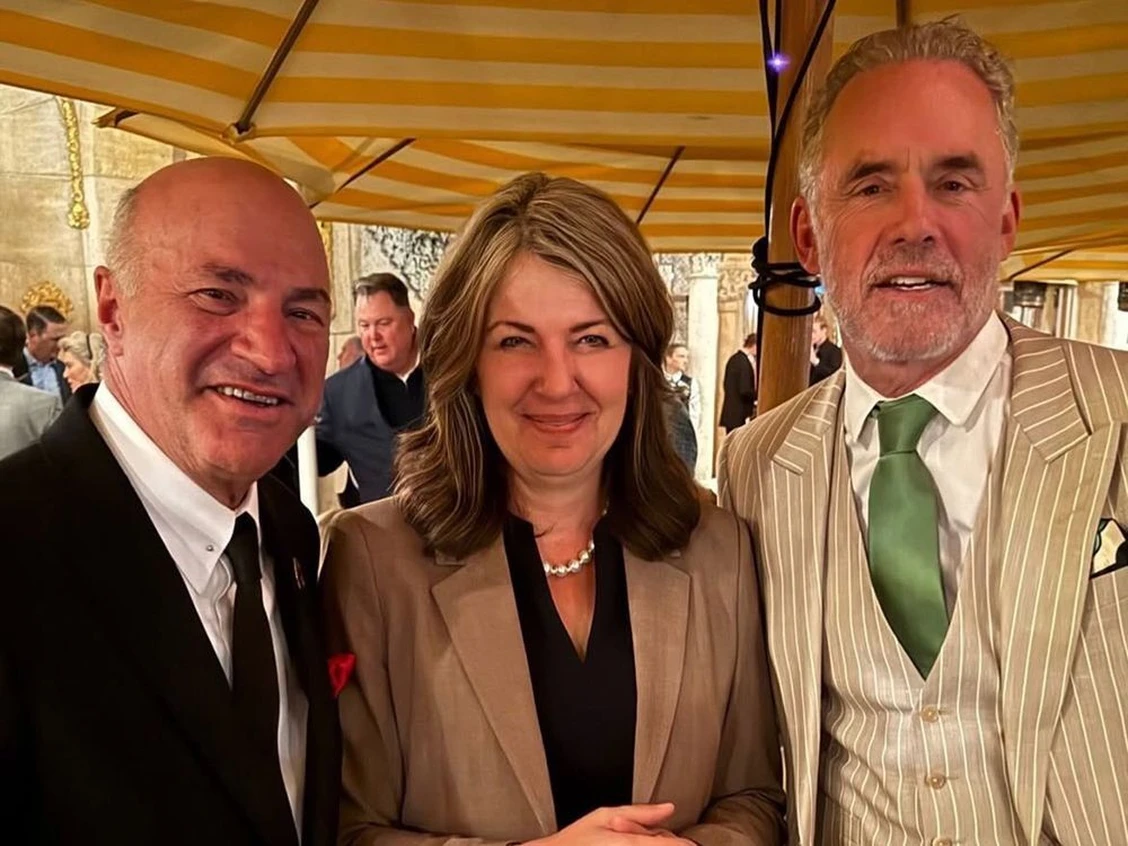
That all being so, it's not as if we have to leave Trump's supposed adoration of Poilievre to somewhat vague and loose connections and conjecture. Because on January 6th, the day before he first broached the topic of making Canada the United States' 51st state (and two and a half months before his aforementioned comments about Poilievre), Trump himself ignited the thermite by clearly stating that he was looking forward to working with Poilievre, making it clear that "our views would be more aligned, certainly" (in comparison to alignment with Trudeau, and presumably to any other Liberal).
The day before broaching the topic of making Canada the United States' 51st state, Trump pointed out that his and Poilievre's "views would be more aligned" than with a Liberal, potentially suggesting that Poilievre would be more amenable to slowly allowing Canada to be subsumed into its neighbour to the south (source: Hugh Hewitt / Salem News Channel)
In other words, Trump's mid-March remarks on Fox News were in all likelihood made as a response – and were thus some form of damage control – to his claims about annexing Canada and making it the 51st state, delivered in the hopes that Poilievre could use the criticisms to falsely create distance between the two and thus resuscitate the Conservative party's chances of winning the election. (Which Poilievre did try to do, claiming that Trump preferred a "weak, compromised and conflicted leadership.… That's why he endorsed Mark Carney yesterday.")
Regardless, even if Peterson wasn't aware of the lattermost clip there's no doubt that he – like virtually every other Canadian – could effortlessly put two and two together and decipher for himself that Trump heavily favoured Poilievre. And not just because both are noticeably right leaning, but because Poilievre was publicly supported and endorsed by the likes of conspiracy theorist Alex Jones, Joe Rogan, Elon Musk, and an array of other Trump allies, while Poilievre staff members, as well as other Conservative staffers across the country, were known to regularly don Make America Great Again hats.
Why did Peterson – who's certainly no dummy – effectively resort to attempted deception of Canadians when stating that "we can conclude from that what we might as Canadians" when speaking about Trump's supposed indifference to who ends up running Canada, when he very well would have known that there was only one logical conclusion that could be drawn from it all? Well, in what is possibly the most illuminating description of Peterson and his methodologies, an article in Current Affairs entitled "The Intellectual We Deserve" (in which the first and final paragraphs are surely some of the best that's ever been written about Peterson), written by editor-in-chief Nathan J. Robinson, states that "there is a tried and tested method" one can undertake if they "want to appear very profound and convince people to take you seriously, but have nothing of value to say". Several steps are described, one being "Never say anything too specific, and if you do, qualify it heavily so that you can always insist you meant the opposite". That is, exactly what Peterson does when it comes to Carney and the Trump effect.
While Peterson closely utilised this methodology with the aforementioned "we can conclude from that what we might as Canadians" statement, his next usage of this rhetorical sliminess came with his declaration that Trump supposedly didn't know what he was doing with his threats.
It's my impression – and I've done some digging – that Trump didn't understand that his comments about Canada and the tariffs and his promise – threat – to turn Canada into the 51st state would be utilised by the Liberals to resurrect them from the well-deserved death they had already managed, and to raise them up above the Conservatives. He didn't know that. Now, you could say well he should have. It's like “yeah, fair enough”. But it doesn't matter, because he didn't. And so I don't know if he would have cared if he did know, but he didn't know.
Once again putting aside the question of why Poilievre and the Conservatives couldn't have equally utilised Trump's threats to their benefit and to thus propel them even further above the Liberals, the most interesting portion of that latter quote to look at is the last sentence: "I don't know if he would have cared if he did know, but he didn't know". In other words, on the one hand Peterson is saying that Trump didn't realise his words would enhance the Liberals' standing, something that, from all appearances, wouldn't be favoured (by Trump or Peterson). But on the other hand, Peterson leaves himself an out by concluding with "I don't know if he would have cared if he did know", enabling him to – as Robinson stated in Current Affairs – "insist [he] meant the opposite".
After all, and if we're to believe Peterson, Trump is a tough guy able to take on any challenger. For as Peterson also stated in that podcast episode (published 17 days before the election, I might reiterate),
Trump is looking at Canada thinking “if Canadians are foolish enough to elect that piker Carney – who's a retread of the worst of Trudeau (although much more effective on the managerial front, let's say) – then we'll be able to crush him extremely effectively at the negotiating table. We have contempt for everything he stands for, and that would be a real good thing for us Americans as we pursue our own self-interest”.
And so if you think that Trump is intimidated by Carney and his international expertise, you don't understand the Americans, and you certainly don't understand Trump. Because not only is that not the case – and I know it's not the case, because I have extensive contacts in DC which I have carefully developed over the last five years precisely for moments like this. And they tell me what's going on. It's not like Trump and the MAGA Republicans think that Carney is a credible canny negotiator that's going to bring them to heal. Quite the bloody contrary.
The bloody contrary!
As Peterson also similarly put it,
[D]on't be thinking that Carney's the guy with the cachet to put Trump back on his heels. Because Trump has faced people who are a lot more intimidating than Carney.
What can be insinuated from this is that seeing how Carney is supposedly a lightweight before the giant that is Trump, Canadians would be wise to vote for Poilievre and the Conservatives if they want a leader able to stand up to Trump (Poilievre being a self-described "tough guy to deal with"). "Trump said he would rather deal with a liberal than with a strong conservative", said Peterson (adding the word "strong" to Trump's actual and earlier-cited comment, for a reason we'll refrain from speculating on).
However, and while keeping that all in mind, 12 days later – now five days left until the election – Peterson went on the Joe Rogan Experience (JRE) and stated the exact opposite to all of the above, specifically about how Trump and the Americans aligned with him are apparently not as tough as was vociferously claimed less than two weeks earlier.
He's gonna pay for that. Because once Carney is elected – if that happens – Trump will not have a more seasoned enemy in the West. Carney is very well connected. Very. Especially in Europe and the UK. Very well.
Listen (and – if you want – watch) for yourself.
(source: Joe Rogan Experience / YouTube)
What happened to "the bloody contrary!"? What happened to "you don't understand the Americans, and you certainly don't understand Trump"? What happened to "[Trump will] be able to crush [Carney] extremely effectively at the negotiating table"?
Well, it's unclear why Peterson would say one thing on his podcast and then the complete opposite on Rogan's, although it's presumably because he was trying to manipulate the two audiences by playing to their differing insecurities. On his own podcast Peterson was trying to convince Canadians to vote for Poilievre lest Canada supposedly lose its sovereignty to the mighty Trump, while on the JRE he was meting out the conspiracy theory / WEF dog-whistles to Rogan's alt-right audience, an audience who after having listened to enough JRE and the like are ever-afraid of absurdities like "the elites" coming for their cows, only to leave them with cricket protein and other edible insects to survive off of.
But what's perhaps even more interesting about that Peterson clip on the JRE – as well as most relevant to this piece and the current situation of Canada's threatened sovereignty – is the way in which Peterson expressed his deep disappointment about how Trump "just timed it so badly". That is, by all appearances Peterson didn't seem to have any problem with Trump's threats to annex Canada and make it the "51st state", his problem seemingly being that Trump couldn't manage to keep his mouth shut for long enough to allow the Conservatives to defeat the Liberals, after which Trump could have then said – and perhaps even done – whatever it was he pleased, be it implementing his 51st state agenda (with the tacit approval of Poilievre and the rest of the Conservatives) or not.
Or in short, Peterson (who left Canada and moved to the US in December of 2024, likely to Arizona to be near his daughter) would have preferred it if Trump had of remained deceptive about his desires/intentions, at least long enough for Pierre "maple MAGA" Poilievre to gain control of the reins and begin the process of – at best – moulding Canada into the image of the United States via all its asinine culture wars and all the rest of it. That isn't exactly a news flash, but not only does the above reveal Peterson to be an intellectual fraud (which isn't exactly a news flash either) that'll say the exact opposite to different audiences depending on what's most expedient to his motives and ideology, but he appears to be all but a traitor to Canada and its sovereignty.
Canadians would do well to disavow themselves of Peterson in every possible way they can and instead leave him to the American deep south.
In conclusion, and courtesy of part one and then this part two, we've now cleared up the two false depictions of Carney as the biggest of benevolent big daddies and the biggest of malevolent big daddies. All the while we've also deciphered that the pronunciations of both (left-leaning) Dean Blundell and (right-leaning) Jordan Peterson are the products of what can fairly be called a couple of swindlers intent on bamboozling Canadians in order to push their (arguably loony) ideas and ideologies, in the process hawking their newsletters, podcasts and other products in order to – ironically in Peterson's case – stuff their pockets with Mark Carney-autographed wads of cash. (This would predominantly mean Peterson, someone who Toronto Life magazine described in 2021 as overseeing a multimillion-dollar corporation, one that's sold life-coaching sessions, t-shirts, hats, self-help guides, and more, to go along with a dodgy business school affiliation and what Peterson has described to Rogan as his ability to "monetize social justice warriors".)
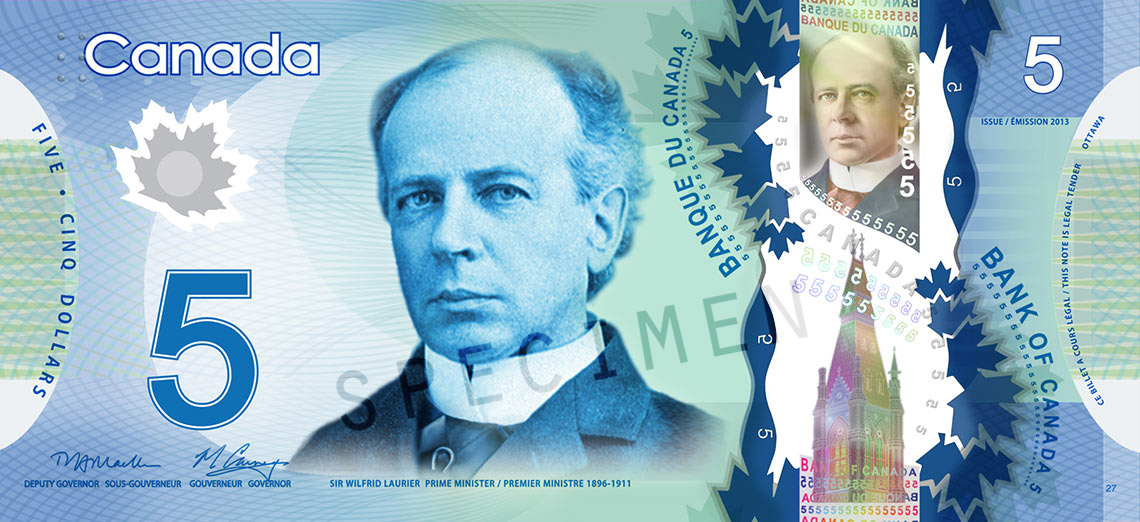
Having enabled ourselves to dismiss the outlandish critiques and praises coming from both the left and the right, what we can in turn now do is set out on more of a "straight and narrow" middle path as we seek to identify not just Carney's actual strengths and weaknesses, but more importantly any blind spots he may have of which ought to be addressed. Identifying these blind spots would be important enough in their own right during more "normal" times, but with the situation the way it currently is due to Canada's sovereignty being threatened by the nation to its south, it's of the utmost importance that all weak spots be identified and addressed by Canadians before they're allowed to be taken advantage of by the United States.



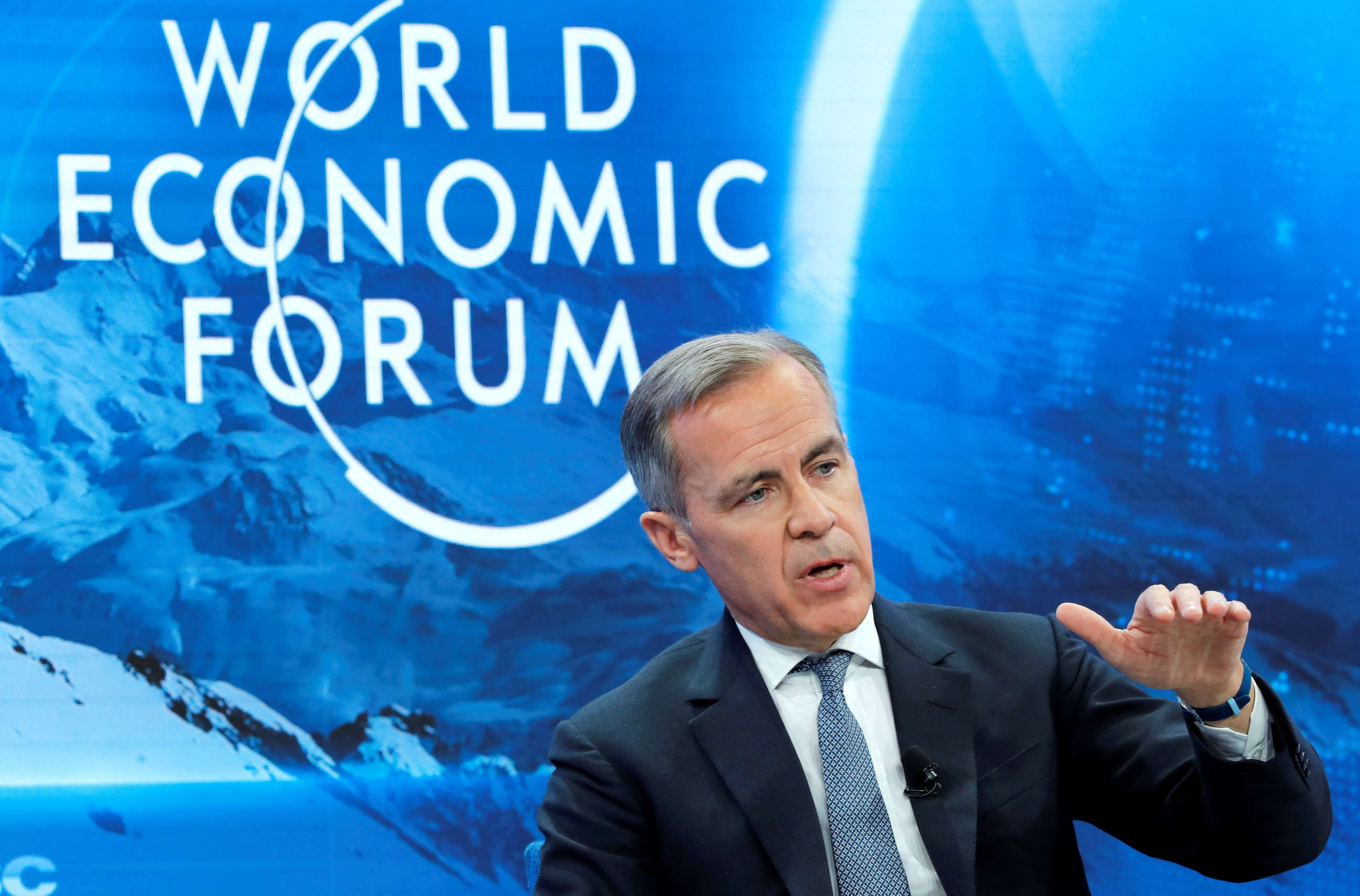

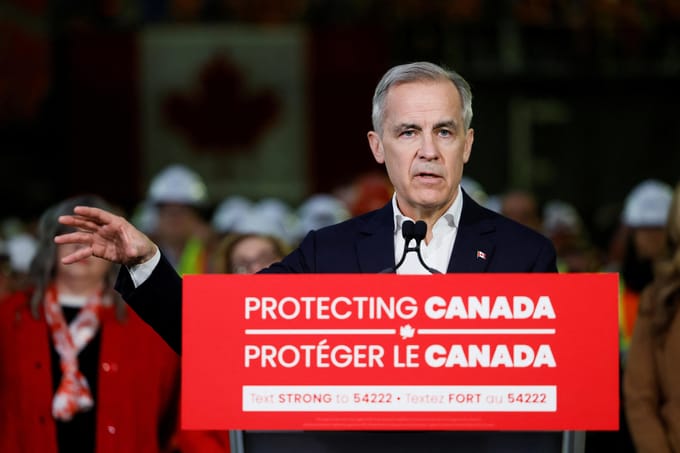






Comments